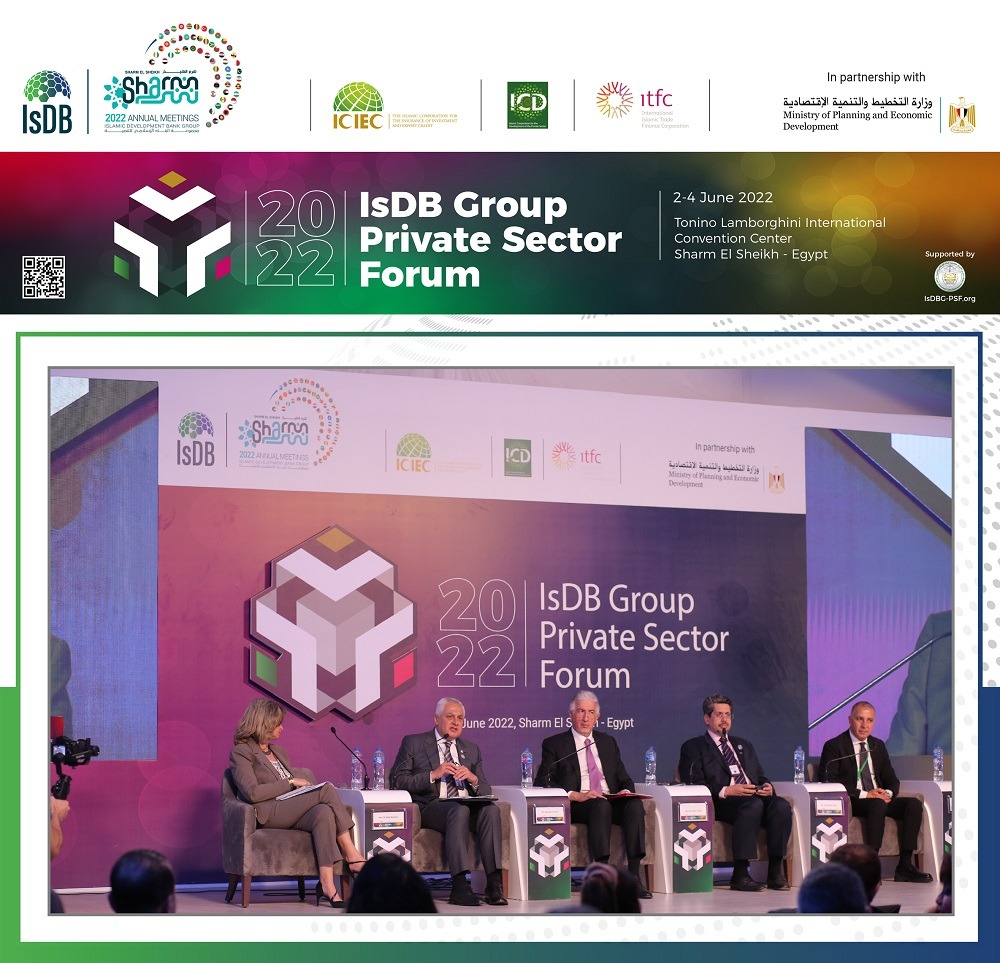Sharm El Sheikh, Egypt -:
The private sector institutions affiliated with the Islamic Development Bank (IsDB) Group organized: “The Private Sector Forum” in its tenth edition, during the period from 2-4 June 2022, at the main conference hall in Sharm El-Sheikh, Egypt. The Forum occurred on the sidelines of the Annual Meetings of the Bank’s Board of Governors, under the theme: “Beyond Recovery: Resilience and Sustainability”.
It is worth noting that the Forum highlighted the activities of the Bank Group, in addition to its services and initiatives in the member countries, including the Arab Republic of Egypt. It also explored the investment and business opportunities and challenges facing the business sector in the member countries, as well as the available financing tools, such as Lines of finance, trade financing and development, and investment insurance, and finally export credit.
Moreover, this event, with its list of activities, presented various economic topics and development projects. The Forum’s program included holding bilateral meetings (B2B and B2G) with the aim of networking, forming partnerships, establishing business relations, exchanging experiences, and presenting success stories.
This Forum witnessed the presence and participation of senior government officials, presidents and CEOs of local, regional, and international private sector companies, along with investors, businessmen, chambers of commerce and industry, trade, and investment promotion agencies, as well as regional and international development financial institutions.
The Forum’s sessions included discussions on the activities, roles, and support provided to member countries. The Forum also addressed issues related to private sector development and trade finance, and the challenges of investment insurance and export credit, with the aim of further encouraging economic and social development among member countries.
During the sessions, the main challenges that hinder the business community and the concerned trade and investment bodies in the Arab region and other member countries were discussed by fostering an environment that allows the parties to take advantage of the available opportunities.
His Excellency Dr. Muhammad Al Jasser, President of the IsDB Group, said: “The Private Sector Forum of the Islamic Development Bank Group in its tenth edition, was held this year in a new form over three consecutive days instead of one day, like what used to happen in the past. The Forum has achieved its objectives and desired outcome during its economic, investment, and business activities and seminars, with the aim of integrating the public and private sectors, which both constitute a basic pillar for economic and social development in our member countries. The public sector is responsible for developing the infrastructure and legislation to create an attractive business climate for the private sector, to be able to develop the production and create job opportunities.”
His Excellency thanked the attendees for participating in the Forum, which included 20 activities, more than 100 speakers, 55 exhibitors, and 2000 participants representing 70 countries. It also witnessed the signing of more than 50 agreements.
During her speech, Dr. Hala El Saeed, Minister of Planning and Economic Development of the Arab Republic of Egypt, expressed her pride in hosting the IsDB’s Annual Meetings by her country for the first time in 30 years, stressing that the goal of the “Private Sector Forum” is to support all development efforts of the private sector in member countries.
El Saeed pointed to the challenges that the world faces, resulting from various global turbulences, pointing to COVID-19’s crisis, then the repercussions of the geopolitical crisis and the Russian-Ukrainian war that occurred before the full recovery from the aforementioned pandemic, stressing that all of these repercussions greatly affect all countries of the world, which is the matter that requires cooperation to make more room for the private sector to participate in the development efforts.
In his opening speech, Mr. Ousama Kaissi, CEO of the Islamic Corporation for the Insurance of Investment and Export Credit (ICIEC), stated: “The Private Sector Forum is an important platform for the Islamic Development Bank Group to engage with various stakeholders in different aspects. The pandemic and the Ukraine war have exposed dangerous fault lines, including supply chain disruptions, failed healthcare systems, resource scarcity, and the rising cost of living that has disproportionately affected millions, especially in low-income countries.”
He added: “We cannot overemphasize the importance of political risk insurance and credit enhancement, which have a proven track record of effectively reducing risk, thereby stimulating private investment in emerging markets through capital efficient bonds. The pressure on national budgets has severely limited the ability of governments to mobilize funds, and the need for the private sector’s capital is greater than ever, as our engagement with this sector must be realigned to include ever-changing development priorities so that we can deliver on our mandates to the citizens of our member countries.”
Commenting on the success of the Forum, Eng. Hani Salem Sonbol, CEO of the International Islamic Trade Finance Corporation (ITFC), said: “Supporting the private sector has become more important than ever and is moving towards a more flexible and sustainable economic development. In this context, ITFC truly appreciates this active participation of the private sector in the Private Sector Forum, during which an excellent platform to enhance the trade and investment opportunities was provided, which was offered by the OIC member countries. Therefore, it is very important that these new business opportunities be financed so that the private sector can operate as an economic catalyst to make a tangible and meaningful impact.”
Mr. Ayman Sejini, CEO of the Islamic Corporation for the Development of the Private Sector, mentioned: “Creating an enabling environment and putting in place appropriate safeguards that need to accompany increased private sector engagement in often sensitive sectors is crucial. A set of guiding principles can help overcome policy dilemmas associated with increased private sector engagement in SDG sectors. A number of tools, including public-private partnerships, investment insurance, blended financing and advance market commitments, can help improve the risk-return profile of SDG investment projects.”

